When running a successful business, HR compliance is of the utmost importance.
Not only does HR compliance protect you from potential legal risks associated with non-compliance, but it also helps ensure that your employees are treated fairly and ethically.
But it’s not as simple as all that:
The laws and regulations that define HR compliance are ever-evolving. That means HR compliance is a living, breathing process you can’t just set and forget.
Rather, HR compliance is a recurring and iterative process you can’t afford to get right. It’s a lot of work.
The Society for HR Management released a 2022 report showing nearly three-quarters of HR professionals feel their departments are stretched too thin.
In this article, we will tell you everything you need to know about HR compliance. We’ll start with the basics, then cover the benefits of doing more than the bare minimum.
We’ll leave you with some best practices and practical tips for implementing your HR compliance protocols.
By the time you’re done reading, you’ll know how to handle the ungainly beast of HR compliance with confidence and efficiency.
What is HR Compliance?
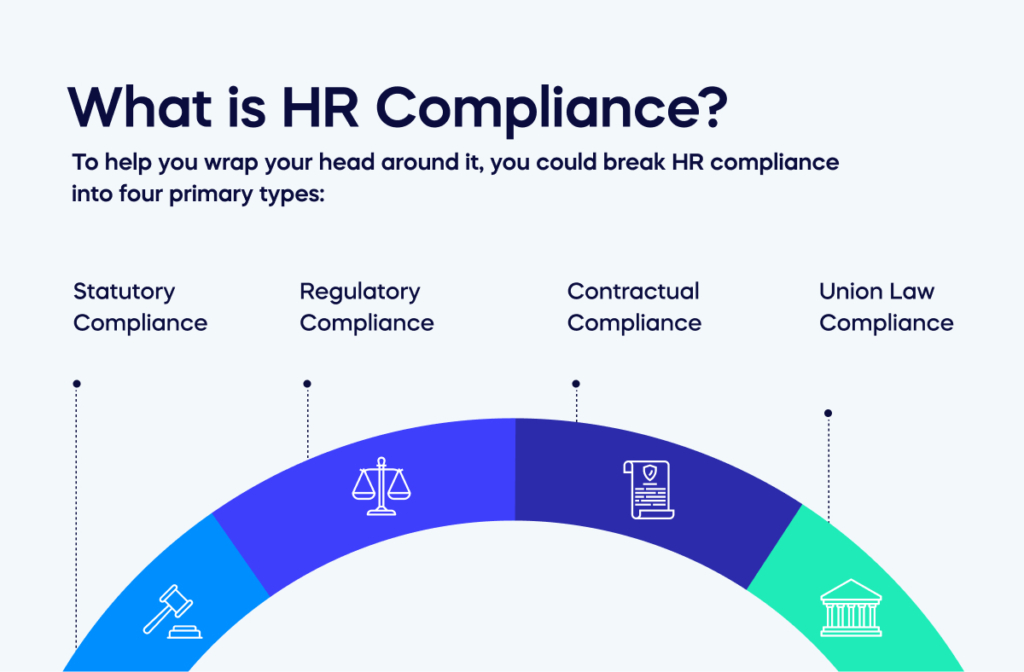
At its core, HR compliance ensures your business adheres to all applicable federal, state, and local laws.
This includes ensuring you’re meeting any applicable requirements related to:
- Wage and Hour Laws
- Medical Leave Laws
- Workplace Safety Requirements
- Data Security
And more.
To help you wrap your head around it, you could break HR compliance into four primary types:
1. Statutory Compliance
Statutory compliance involves adhering to all laws, regulations, and other legally enforceable statutes set by your government.
For example, there are laws that dictate maximum weekly working hours and minimum wages.
2. Regulatory Compliance
Regulatory compliance requires following the rules and protocols of regulatory bodies such as the U.S. Department of Labor or the Equal Employment Opportunity Commission (EEOC).
These rules and protocols aren’t laws, but you must follow them as strictly as if they were.
3. Contractual Compliance
Contractual compliance means adhering to contractual agreements between your business and employees, including contracts for independent contractors.
4. Union Law Compliance
Union law compliance entails following the guidelines set forth by labor unions that may represent your employees.
This might include collective bargaining agreements (CBAs) or anything else your employees wish to press.
Why is it Important to Stay HR Compliant?
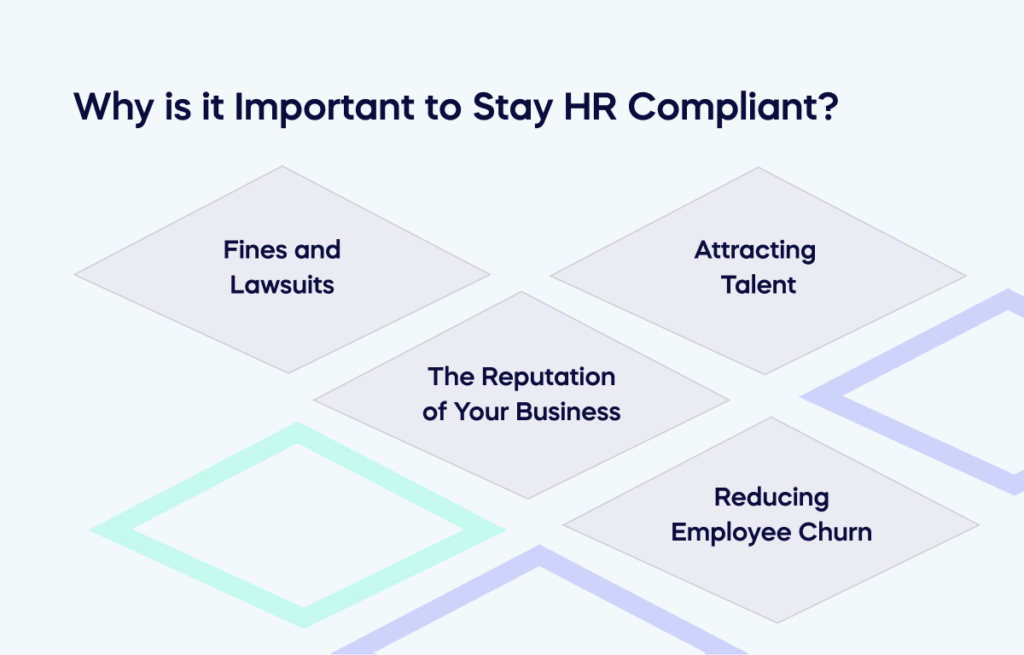
We’ve talked about all the different rules and governing bodies that make the rules you need to follow— but what happens if you’re non-compliant?
Here we’ve listed a few of the repercussions you can expect if you fail to maintain HR compliance.
Fines and Lawsuits
The most obvious reason why it’s important to stay HR compliant is to avoid potential fines and lawsuits.
Even if you don’t intend to violate any laws or regulations, one lawsuit could be enough to put your business in jeopardy. Fines can also add up quickly, leading to a serious financial burden.
It’s better to be proactive and stay compliant from the start than to risk being on the wrong side of a lawsuit or hefty fines.
The Reputation of Your Business
Beyond avoiding legal complications, staying HR compliant is also important for your company’s reputation.
Compliance with labor laws and regulations is a badge of honor for businesses.
It conveys that you care about your employees and are willing to go above and beyond to protect them. It also makes you a more desirable partner for business engagements.
Attracting Talent
Staying HR compliant can also help you attract talented workers.
Job seekers want to know their rights will be respected in the workplace, and that they’ll be treated fairly and equally.
A HR-compliant business will stand out to job seekers and make your organization more attractive than other employers.
Reducing Employee Churn
Finally, staying HR compliant can help you keep employees in the long term.
Employees who feel their rights are respected in the workplace are likelier to stick around. Employees who have to fight over every scrap of what they’re entitled to will not.
HR compliance helps create a safe and secure work environment, allowing employees to feel secure and less likely to look elsewhere.
HR Compliance: The Benefits of Doing More
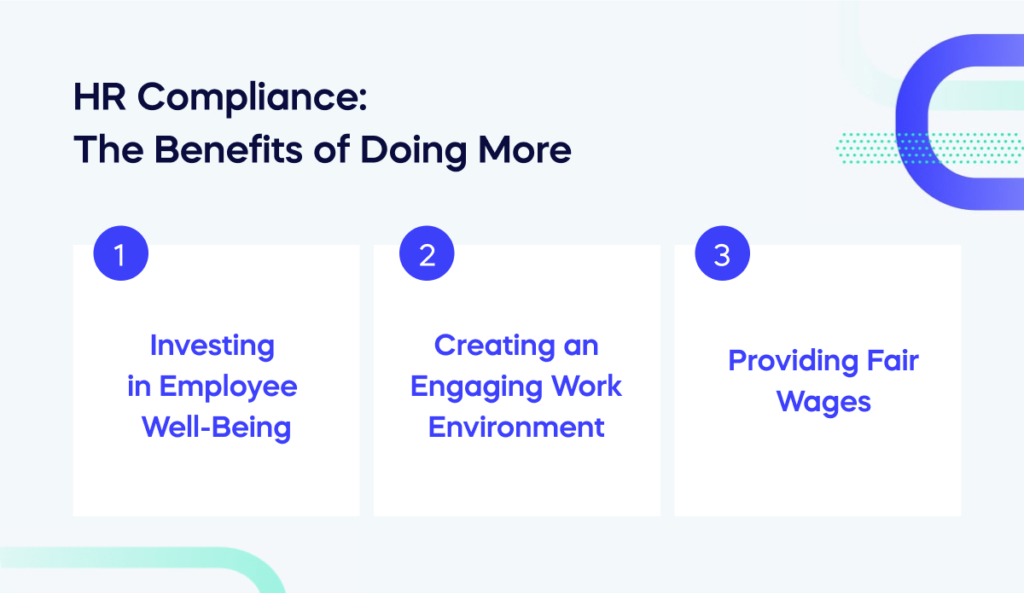
While HR compliance is the minimum requirement for any business, there are benefits to going above and beyond by implementing people-first policies.
A 2022 survey by HR Dive found that 36% of HR professionals believe that finding and acquiring talent is their top stressor. You could make their job easier by simply having more to offer.
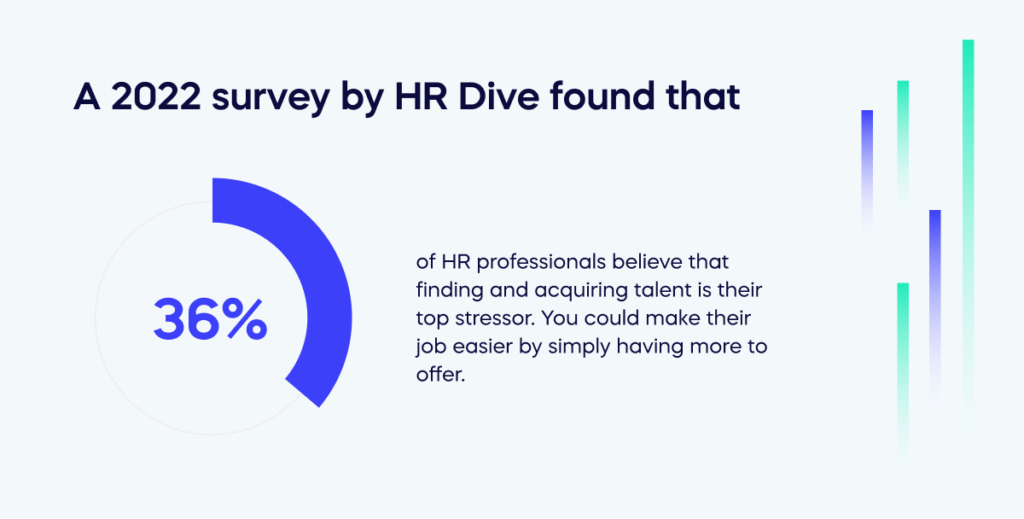
Here are a few ideas for people-first HR compliance policies:
Investing in Employee Well-Being
Providing comprehensive employee resources that focus on their well-being can go a long way toward creating a happier and healthier work environment for everyone.
This can include offering flexible work arrangements, adding more time off for vacation, or creating incentive programs that reward employees.
Creating an Engaging Work Environment
Creating an engaging workplace means empowering your team by giving them the tools they need to succeed.
This could mean providing training and development opportunities, investing in digital transformation, or providing a positive environment that encourages collaboration and camaraderie.
Providing Fair Wages
We’re not talking about matching minimum wage. We’re talking about truly competitive compensation.
Ensuring your team is provided with competitive wages that reflect their hard work benefits them and can lead to improved productivity and higher employee retention rates.
By providing fair and equitable wages, you’ll be able to attract the best talent and keep them around for the long haul.
Practical Tips for Improving Your HR Compliance
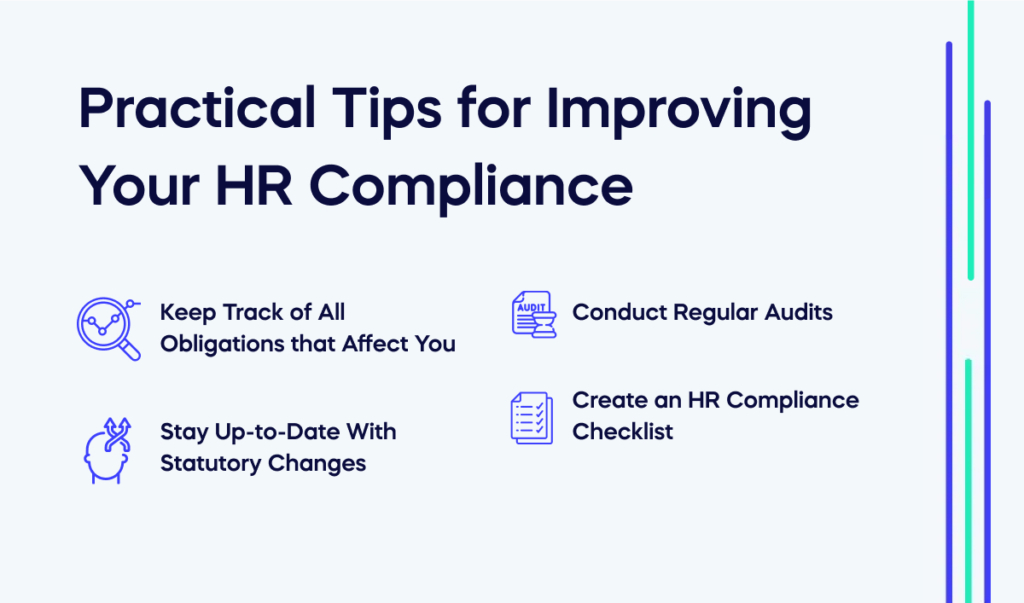
Now that you understand the importance of HR compliance and what it can do for your business let’s look at some practical steps you can take to stay compliant:
Keep Track of All Obligations that Affect You
You need to know all the laws, regulations, and standards that affect your business. This includes federal and state labor laws as well as industry-specific requirements.
You should keep a database of this information somewhere and ensure your HR team knows how to find relevant information when needed.
Stay Up-to-Date With Statutory Changes
The legal landscape is continuously evolving, so staying informed of any changes that may affect you is important.
Make sure you have a system in place to alert you when there are updates or new regulations, and be proactive about making those changes.
Read more HR content and network with other HR professionals to keep up with the news.
Conduct Regular Audits
Regularly conduct internal audits to ensure your policies and procedures are up-to-date and that you’re in compliance.
We recommend that you enlist an external auditor’s help to ensure everything is handled properly.
You’re not likely to catch the problems you missed in the first place, so having a second pair of eyes helps.
Create an HR Compliance Checklist
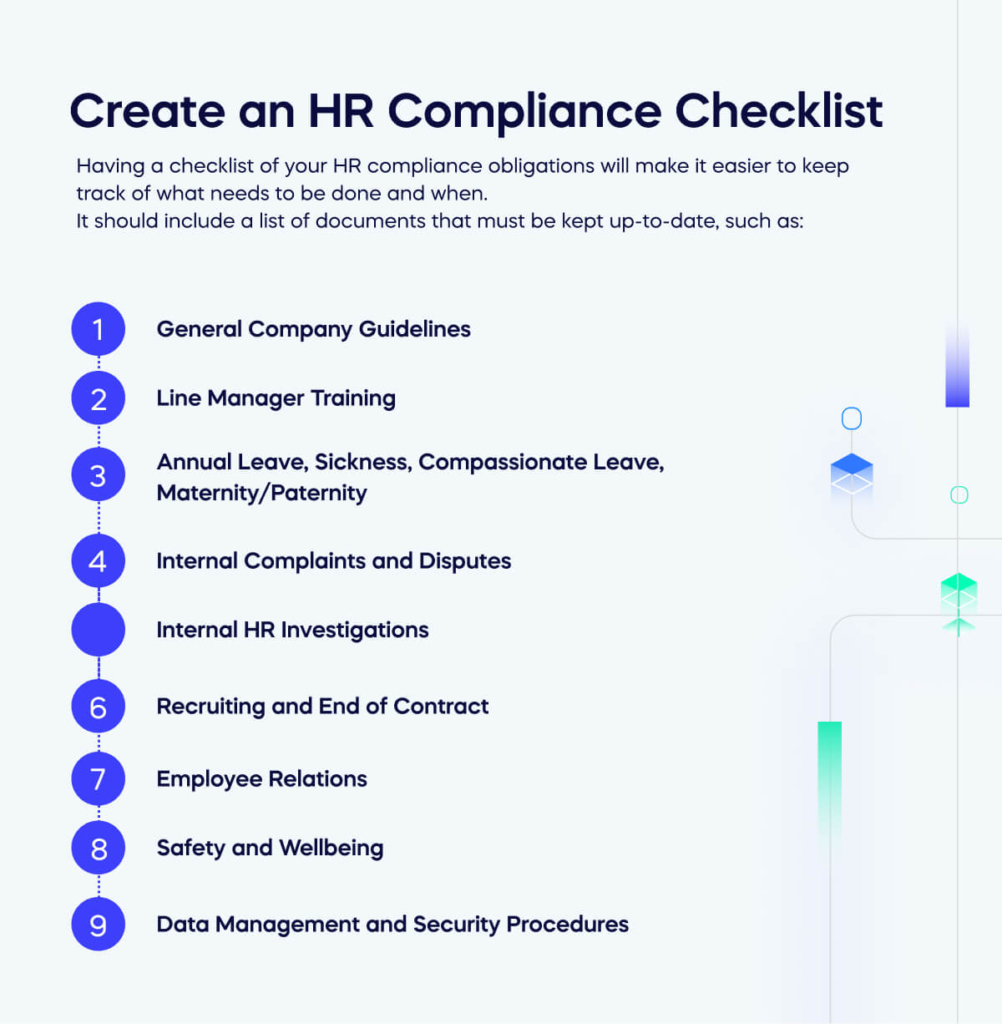
Having a checklist of your HR compliance obligations will make it easier to keep track of what needs to be done and when.
It should include a list of documents that must be kept up-to-date, such as:
- General Company Guidelines
- Line Manager Training
- Annual Leave, Sickness, Compassionate Leave, Maternity/Paternity
- Internal Complaints and Disputes
- Internal HR Investigations
- Recruiting and End of Contract
- Employee Relations
- Safety and Wellbeing
- Data Management and Security Procedures
This list isn’t exhaustive, and you may not need every document. But it’s a good place to start, to get you thinking about HR compliance correctly.
Best Practices for HR Compliance
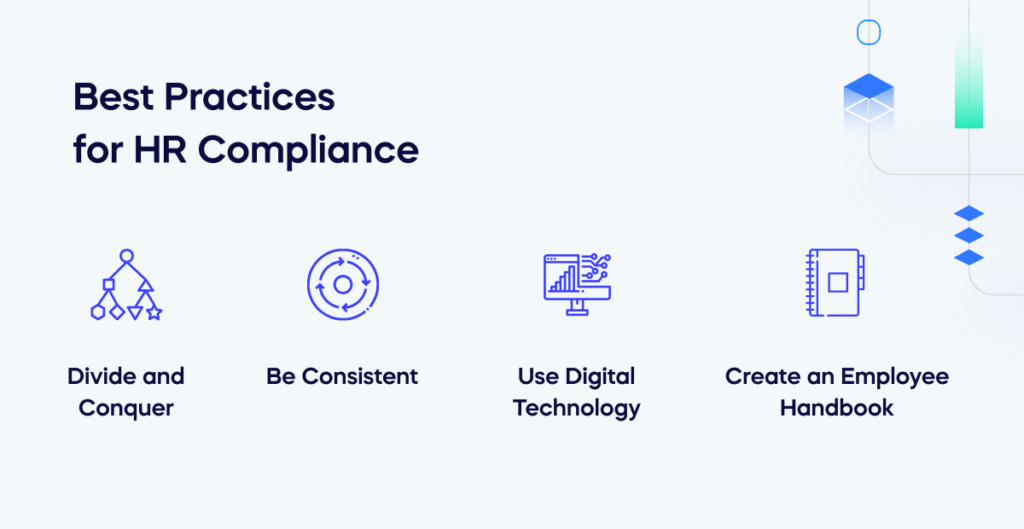
You don’t want to be in a constant state of panic trying to keep up with HR compliance changes, and you definitely don’t want to create policies your employees have no faith in.
These best practices will help you make HR compliance a part of your business, weaved into every decision.
Divide and Conquer
Compliance is complex and requires multiple skill sets, so it can be helpful to divide up the responsibilities within the HR team.
For example, you could create an HR Compliance Officer role responsible solely for staying on top of updates and ensuring your employment practices are compliant.
You should also ensure that all HR team members understand their individual roles and responsibilities in terms of compliance.
Be Consistent
It’s important to apply policies consistently and fairly. This means all employees should be treated equally and have the same opportunities and resources.
This also applies to disciplinary procedures; everyone should face the same consequences for any misconduct or breach of policy. Everyone.
Ensure your staff understands what’s expected of them, and ensure your policies are consistently applied.
Use Digital Technology
One of the most powerful changes you can make is to use digital technology to streamline your HR processes and ensure compliance.
This could include tools that help you track employee performance, attendance, and training progress.
Automated systems can also be used for payroll processing, job applications, onboarding, and other HR-related tasks. You’re much less likely to make easily avoided compliance errors this way.
Alternatively, you could consider outsourcing your HR compliance tasks to an external service provider, for an added layer of guaranteed protection.
Create an Employee Handbook
HR compliance is complicated. There’s a lot of information to know, and even HR professionals can’t remember it all— take it from us.
So, you can’t expect your employees to understand it all, either. But they do deserve to have their questions answered.
An employee handbook is a great way to ensure employees understand company policies and procedures.
It should include information about benefits, rules and regulations, job descriptions, disciplinary action, and other important topics. Having this in writing also helps protect you from potential legal issues.
What’s Next in the World of HR Compliance?
Doing “just enough” is no longer enough.
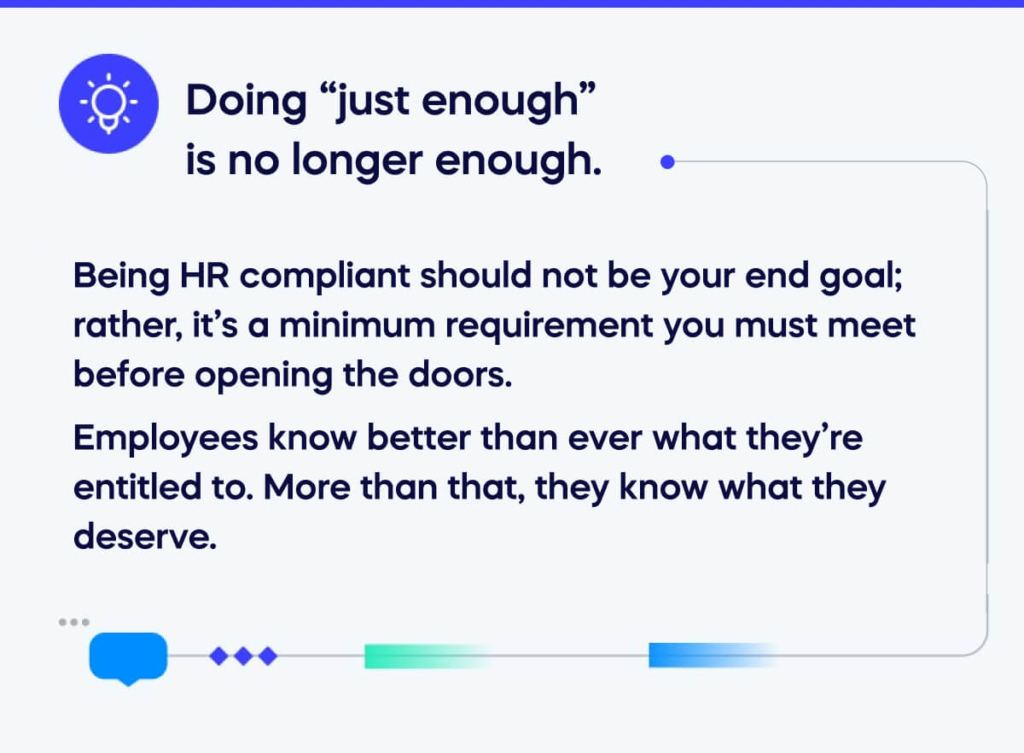
Being HR compliant should not be your end goal; rather, it’s a minimum requirement you must meet before opening the doors.
Employees know better than ever what they’re entitled to. More than that, they know what they deserve.
Being HR compliant is essential to be a reputable, legal business. But it’s not enough to give you a competitive edge.
If you want to complete, you must use HR compliance as a foundation to build a business that attracts and retains talent.

